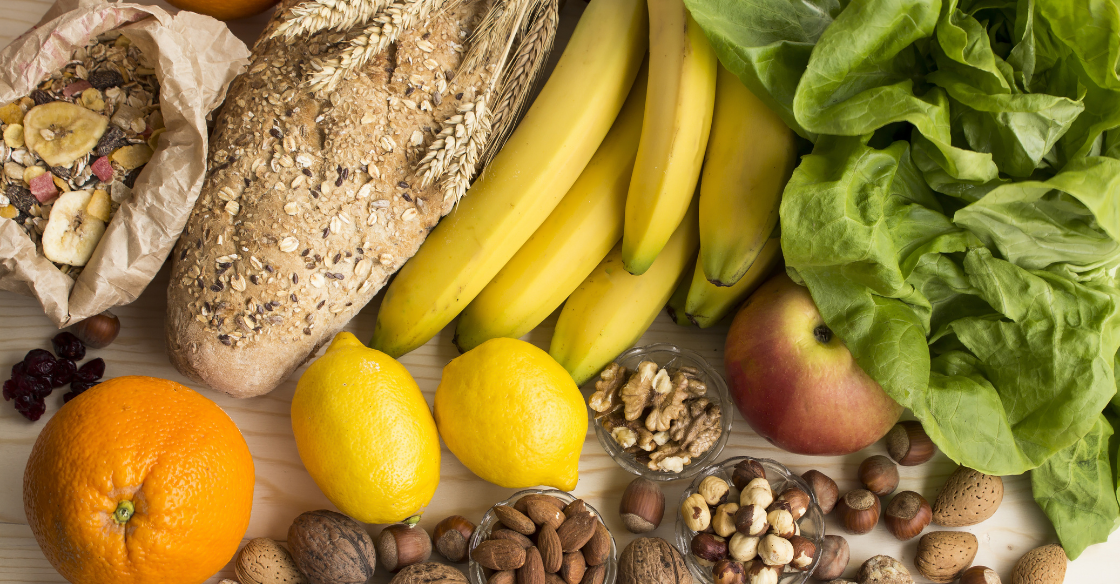We all know that a healthy diet is rich in whole foods like fruits, vegetables, lean protein, and whole grains. These dietary choices provide myriad benefits, including being rich in fiber and potassium. But what are the benefits of fiber and potassium?
Foods high in fiber and potassium can promote healthy bowel movements and blood sugar, increase your energy, lower blood pressure, and help promote weight loss. And the good news is, incorporating high-fiber and high-potassium foods into your diet is easier than you might think.
Read on to learn more about the benefits of each, good sources of potassium and fiber, how much you need each day, and more.

What Are the Benefits of Fiber?
Dietary fiber includes part of plant-based foods that the body cannot digest. While the body can digest components like carbohydrates, protein, and fat, fiber isn’t digested. Instead, fiber passes through the stomach and out of the body.
There are several benefits of a high-fiber diet, including:
Supports Bowel Movements
Fiber increases the size of stools while softening stools as well. A stool that is larger and softer is easier to pass and decreases your chances of constipation.
Supports Bowel Health
In addition to supporting bowel movements, a diet rich in fiber can help support overall bowel health by lowering your chance of hemorrhoids, diverticular diseases, and potentially colorectal cancer.
Supports Blood Sugar Levels
Fiber can help to slow the absorption of sugar, which can help improve blood sugar levels overall. When blood sugar levels are healthy, your risk of developing type 2 diabetes is lower as well.
Increased Energy
Since fiber can support blood sugar levels, it can also prevent energy dips. If you’re eating enough veggies and other high-fiber foods, you will notice that you are less likely to get the afternoon sugar cravings that often occur if your diet consists of too many processed carbs.
Supports Weight Loss
Research shows that fiber has appetite-suppressant qualities that can help you feel more satiated and reduce unhealthy snacking. Fiber can help keep you full longer, especially if paired with a protein or healthy fat, which can help in weight loss efforts too.
In fact, a recent study found that people who made no changes to their diet, except eating more fiber, lost almost as much weight as people who followed the heart-healthy, low-fat eating plan recommended by the American Heart Association.
How Much Fiber Should You Have Per Day?
According to the Institute of Medicine, the recommended daily fiber intake per day for men and women are as follows:
- Men 50 years old or younger: 38 grams
- Men 51 year old or older: 30 grams
- Women 50 years old or younger: 25 grams
- Women 51 year old or older: 21 grams

What Are the Benefits of Potassium?
Potassium is a mineral and electrolyte found in many of the foods we eat. Potassium is essential for life, but the body doesn’t produce potassium naturally, so it’s important to consume foods with the right mineral and electrolyte balance. Consuming too little or too much potassium can have negative effects on the body.
Potassium has several benefits, including:
Lowers Blood Pressure
A study showed that eating more potassium is associated with lower blood pressure, even without cutting back on salt.
The study authors explain that, while decreasing sodium intake is a well-established way to lower blood pressure, evidence suggests that increasing dietary potassium may have an equally important effect on hypertension.
May Prevent Osteoporosis
Osteoporosis (a condition characterized by hollow, porous bones) is linked to low calcium levels and other important minerals. Studies show that a diet rich in potassium may help prevent osteoporosis by preventing calcium loss in the body.
May Prevent Kidney Stones & Reduce Water Retention
Similarly, potassium may also help prevent kidney stones. By lowering calcium levels in urine, a diet rich in potassium can support urinary health. Because potassium can support urinary health, it can also help reduce water retention by increasing urine production.
How Much Potassium Should You Have per Day?
An Institute of Medicine report recommends that adults consume at least 4700 milligrams of potassium per day to lower blood pressure, blunt the effects of dietary sodium, and reduce the risks of kidney stones and bone loss.

What Foods Are High in Fiber and Potassium?
Fiber and potassium are essential for healthy living, and the good news is incorporating both into your diet is easy. When aiming to add more fiber and potassium to your diet, turn to whole foods whenever possible. Refined or processed foods like white bread, pasta, canned fruits and vegetables, and non-whole-grains have lower fiber content.
Sources of Fiber
- Fruits
- Vegetables
- Nuts
- Seeds
- Whole-grains
- Beans, peas, and legumes
Sources of Potassium
- Winter squash, cubed, 1 cup, cooked: 896 mg
- Sweet potato, medium, baked with skin: 694 mg
- Potato, medium, baked with skin: 610 mg
- Broccoli, 1 cup, cooked: 457 mg
- Cantaloupe, cubed, 1 cup: 431 mg
- Banana, 1 medium: 422 mg
Bonus tip: Boiling depletes potassium. For example, a boiled potato has almost half the potassium of a baked potato. To preserve potassium, eat fruits and vegetables raw, or roast or lightly steam them.
Consult Olde Del Mar for More on Improving Your Diet
Working more vegetables into your day can be a good way to maintain a healthy weight or achieve a weight loss goal. However, it can be tough to lose a substantial amount of weight – and keep it off – with diet alone. If you’d like to learn more about surgical weight loss and non-surgical treatments for weight loss, contact us at Olde Del Mar Surgical.
You May Also Like
-
4 Healthy Grilling Tips That Maximize Flavor
Jul 31, 2019
-
5 Reasons To Stop Putting Off Weight Loss Surgery Today
Mar 05, 2019
-
Can You Drink Alcohol After Bariatric Surgery?
Jul 01, 2019
-
3 Things to Know When Considering Weight Loss Surgery
Feb 20, 2019
-
The Importance of Choosing the Right Bariatric Doctor
Mar 08, 2019